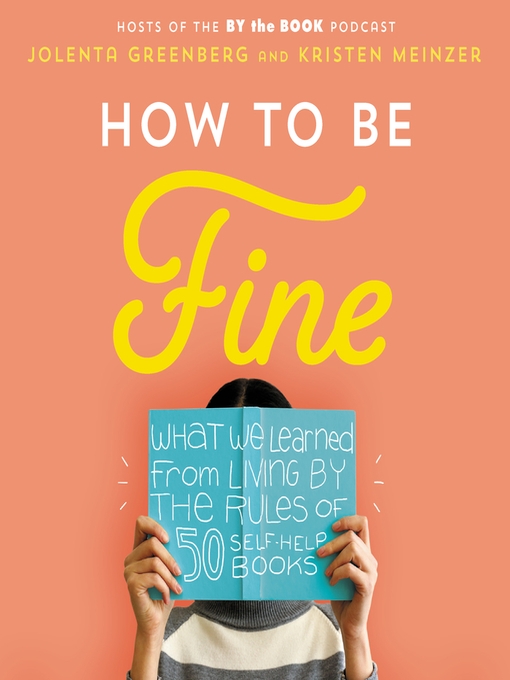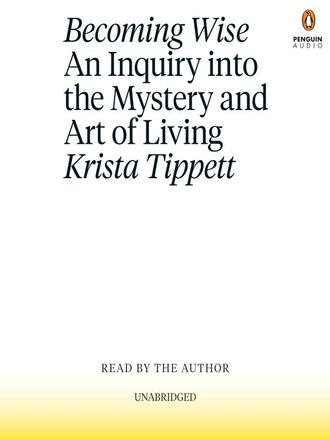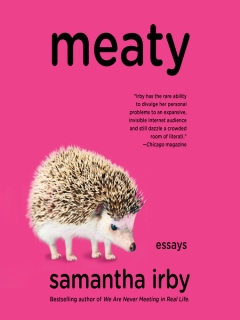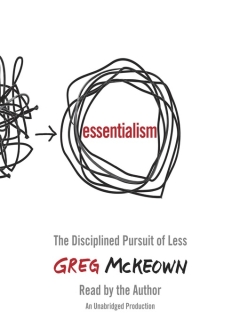By now, we hope that you’ve been able to establish some sense of stability, if even occasionally tremulous, despite having so much of what we understand about our college and higher education experiences intensely challenged over the last two months. As we approach the close of the 2019- 2020 academic school year, this last entry in the Words for Wellness series is especially for graduating seniors. In a culture that praises us for being chipper, upbeat and optimistic, let me introduce you to an audiobook in our Overdrive collection titled How To Be Fine. Not how to be great. Not how to be excellent. Not how to be thriving. How to be fine. We’ve all had to alter and adjust our expectations for an extended period of time and we’re not certain what we’ll return to once our collective “hiatus” comes to an end. If you’re looking for ways to maintain a sense of equilibrium, How To Be Fine is chock-full of testimonies and tips, and is a critical examination of the self-help book.
Over the last several weeks, the recommended reads in this series have encouraged us to establish a routine and to both parse out and prioritize the essential. This week’s title asks that if we do choose to approach self-help genre literature at all, that we thoroughly study its sources of origin, applying only the advice that works for us and eschewing the pressures felt to commit to popular wellness fads and trends. For graduating seniors facing uncertain terrain following graduation, this piece of advice is one of many to chew on. Friends, colleagues and authors Jolenta Greenberg and Kristen Meinzer developed a podcast together called “By the Book” in which they followed the advice of a broad plethora of self-help books in order to evaluate what impact(s) they would have on their lives. How To Be Fine is a compiled redaction and recording of their impressions and responses. Or, as one Amazon reviewer described it, it’s the “sparknote version of over 50 self help books.” Among the titles visited are
On their journey, the women encounter authors who tout practices like meditation, dieting, gratitude journaling and others who swear by early mornings, fastidious organizing, and more. Yet with the precarity we can expect, any one-size fits all model designed to better prepare us for the future will surely fall short of our needs.
In the audiobook version, Greenberg and Meinzer alternate in narrating the chapters, telling listeners what new habits they adopted for a time and how well or poorly they were able to incorporate them into their lives. For example, the aforementioned practice of externalizing gratitude went well but waking up early was less successful. In How To Be Fine, listeners hear the writers’ reflections on having made themselves willing guinea pigs, vulnerable to the varied advice of dozens of wellness gurus. They are cautious and skeptical, recognizing that the wellness industry is highly profitable for those doling out advice and can be equally predatory for those receiving it. This critique never escapes their lens and each retelling of their experiences is followed by a letter from a member of their podcast audience, offering pushback, pressing them to relent in some way in their analyses. Greenberg and Meinzer then respond thoughtfully to each objection, offering a thoroughness and defense not commonly seen surrounding popular works.
If you’re looking for fresh, contemporary voices to help orient you as you approach a major life transition, How To Be Fine may have some gems for you. For another audiobook born from a well revered podcast, see former Middlebury commencement speaker Krista Tippett’s Becoming Wise: An Inquiry Into the Mystery and Art of Living. (For her speech, click here.) For Part I in this series, click here. For Part II, click here. And as always, for help with your research needs, find a librarian through go.middlebury.edu/askus.
Follow the transcribed instructions below to access audiobooks in our collection.
- Download the Overdrive app to your listening device and create an original account.
- Sign in and add the “Davis Family Library.” A prompt to sign in with a library card will appear; accept, but use your Middlebury College credentials instead.
- Browse the available selections found at go.middlebury.edu/overdrive, choose a book and borrow up to three.
- Download the desired MP3 files and access your loans from your electronic bookshelf.
- Listen or read to your heart’s content and share this info with a friend.
When the time comes, consider getting a library card from the Ilsley Public Library in Middlebury to access the Green Mountain Library Consortium (go.middlebury.edu/gmlc/), which holds 5,000+ FREE titles. Use your library card barcode and your last name in all caps (examples: QUIÑONEZ or TRUONG) as your password and borrow both classic titles and new releases!






